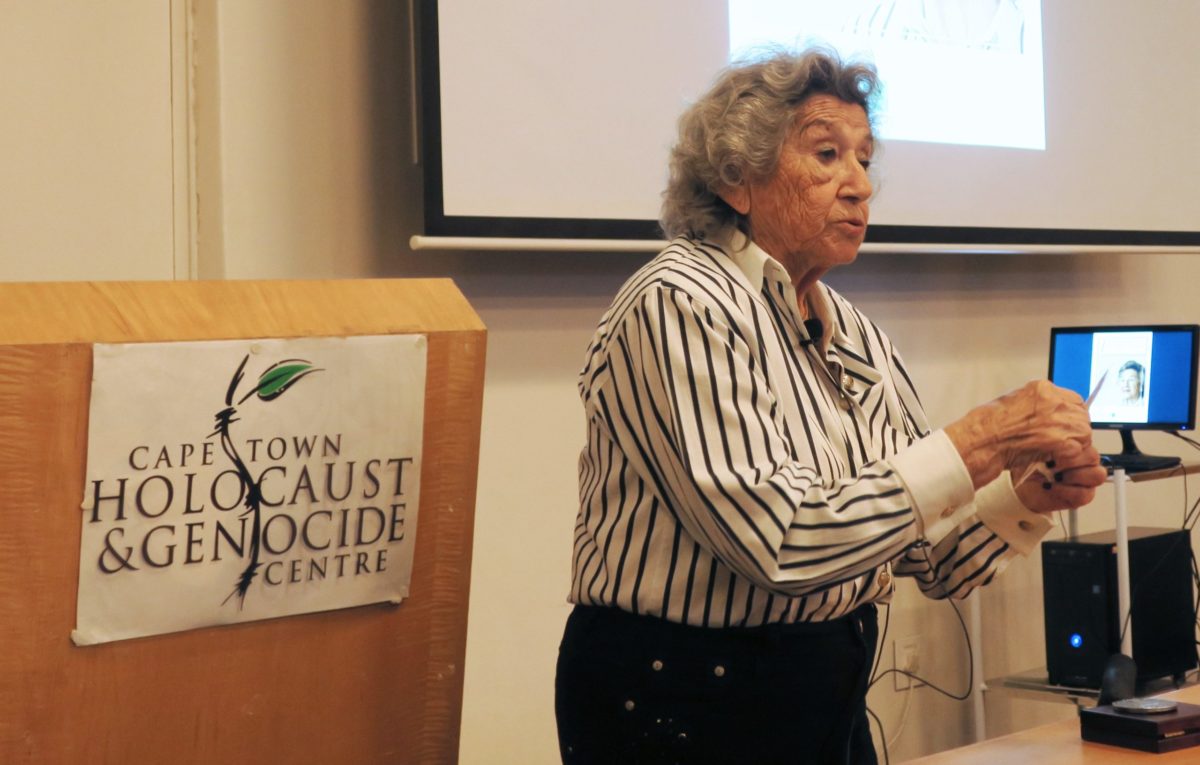click to dowload our latest edition
CLICK HERE TO SUBSCRIBE TO OUR NEWSLETTER


Published
4 years agoon
By
adminMOIRA SCHNEIDER
Blumenthal’s talk at the Cape Town Holocaust & Genocide Centre last Wednesday was part of a series of events to mark international Holocaust remembrance.
Blumenthal was born in Warsaw in 1921, the youngest of seven. In 1940, after the Germans invaded Poland, she and her family were forcibly moved to the Warsaw Ghetto.
“The ghetto was overcrowded,” she recalled. “We managed to bring some of our belongings, but the best of our goods were stolen by the Poles.
“But we didn’t forget our own Sefer Torah, which my father saved.” In the ghetto, there were 10 to 15 people in a room, with sickness and death all around.
One couldn’t survive on the food rations, so young boys took to smuggling it in. They were so malnourished, that they managed to squeeze through the walls of the ghetto “carrying their mother’s wedding ring, begging for food”.
“They were often caught,” she related. “At best they were beaten up and the food was taken from them, most of the time they were shot.
People were being deported to what the Nazis termed “labour camps”.
“We [initially] didn’t believe the rumours going around that people were being killed, but we [eventually] had to face the truth. In the meantime, the roundups were continuing, and the population was shrinking. My own family was getting smaller and smaller – I lost practically every one of my beloved family.
“There were three of us left – my father, eldest niece, and myself. We realised it was no use hanging around, and that we must go into hiding. There was no time for tears,” she said. With some friends, they found an abandoned flat.
“We bricked up the doorway leading to the last room in the flat, pushed over a wardrobe, found a spot leading to our room from the flat above, and lowered ourselves into the bricked-up room. We sat there every morning listening to the Nazis shouting, “Where are the cursed Jews?”
“We heard heavy boots on the staircase. The mother of a small child had to cover his face with a pillow in case he cried out. We came out every night to get a little bit of food.”
She remembers her father on erev (the eve of) Pesach in 1943 sharing pieces of matzah with everyone around them, and praying that G-d would save them as he had the Jews in Egypt. The next morning, the Nazis were met with Molotov cocktails and homemade bombs.
“The Warsaw Ghetto uprising was on. The Nazis were taken by surprise and withdrew – German blood was flowing in the streets of the ghetto.”
But the uprising was crushed the following day when the Germans arrived with reinforcements. “In retaliation, the Nazis decided to get out every Jew alive but in hiding, so smoked us out – they set the ghetto on fire building by building.”
Fortunately their group had prepared a much safer bunker. “We had some provisions, small pieces of dried bread, water, candles. We lowered ourselves into the bunker in which we could only sit or lie because the ceiling was very low. “Every night, we would crawl out to get fresh air and stretch our limbs. One morning, we heard heavy footsteps and knocking on the trapdoor.
“’Get out cursed Jews, otherwise we’ll gas you.’ We had no choice. We were waiting to be shot. We had to place our valuables in a sack, and were chased to the Umschlagplatz, a railway siding where human beings were pressed into cattle trucks to capacity. The train landed outside Majdanek.
“I tripped as I walked [in] and was trying to keep up with the others on all fours while a dog was biting into my back. I was waiting to be shot. Eventually the dog was called off when the guards had had enough fun and stopped laughing,” she recalled.
At Majdanek, men and women were separated. Mothers with babies, older women, and children were sent to “the showers”.
“When my father tried to have a last look at me and my niece, he was hit over the head. I never saw him again.”
Then followed a selection: to the right meant life, to the left, the gas chambers. “I lifted my head and shoulders high, and was sent to the right and so was my niece.”
Sometime afterwards, their group was sent into the gas chambers. “When the heavy doors shut behind us, we realised poisonous gas would come down at any minute.
“We prayed ‘Shema Israel’, we were scraping the walls, I was holding my niece’s hand, whispering to her, ‘Don’t be afraid, it won’t hurt, I don’t think it’ll take long, and we’ll soon be with our loved ones.’”
At that point, a Nazi marched in saying, “You aren’t going to be gassed.” The Nazis had received an order to gas 500 – Blumenthal’s group comprised 700.
Then followed Auschwitz, where Blumenthal contracted typhus. “I was afraid to be sent to the hospital because Mengele used to order the sick to be sent to the gas chambers,” she remembered.
“I decided I must remain in the camp, and take a chance, hiding in the back of the blockhouses and the latrines until my temperature dropped.” Eventually she was liberated from Bergen-Belsen by the English army on 15 April 1945.
